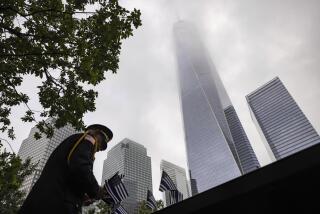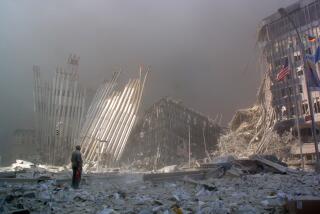40% Tell of Stress Following Attacks
- Share via
More than 4 in 10 adults suffered serious stress reactions in the days immediately following the Sept. 11 terrorist attacks, according to a new survey by the Rand Corp. to be published today in the New England Journal of Medicine.
The survey, among the first to quantify the emotional toll of the attacks, confirms anecdotal stories of grief that have been reported around the country, said lead author Mark A. Schuster, a Rand Corp. researcher and UCLA pediatrician. Rand is a Santa Monica-based research group.
The report also highlights the need for a quick response by counselors, teachers and clergy to help people deal with disasters, even for people far from the attack sites in New York City and Arlington, Va.
The survey of 560 adults, conducted Sept. 14 to 16, found that 44% experienced at least one significant stress reaction after Sept. 11. These reactions included having difficulty concentrating, feeling very upset, feeling irritable, having trouble sleeping or having disturbing memories or dreams. Nine in 10 people reported at least low levels of those stress reactions.
Those disproportionately affected included women, minorities, people with previous emotional problems and people who watched extensive television coverage on Sept. 11.
The study also found that 35% of children older than 5 had problems and 47% worried about their safety, according to their parents.
“It’s important for people to know that they’re not the only ones, that this is occurring all over the country and that there are a lot of people experiencing this,” Schuster said. “It’s not pleasant to have these symptoms, but people are quite resilient.”
In the days following the attacks, crisis counselors nationwide reported a surge in requests for stress debriefings for employees. These meetings allowed workers to discuss how the attacks affected them and to ask questions about how to explain the events to children.
But, counselors say, the events since Sept. 11 have made it difficult to reestablish a routine.
“About the time you start to emotionally settle from the tragedy itself, then the anthrax thing raises its head. And then the airplane crashes,” said Robert T. Dorris Jr., president of Robert T. Dorris & Associates, an employee assistance firm in Agoura Hills.
“Every human being has a reserve of coping mechanisms, and when you keep them in overload long enough and there’s so many unknowns, people stay in a high anxiety state.”
People responded to stress in different ways, the survey found. Nearly everyone--98%--talked with others about their thoughts and feelings. Nine in 10 turned to religion and 60% participated in group activities, such as discussions and vigils.
Three-quarters checked the safety of immediate family members or friends; 36% donated blood or money or volunteered; and 18% procured extra food, gas, cash or other supplies.
Few scientifically valid studies have been conducted in the days following disasters, Schuster said. After the Oklahoma City bombing, for instance, researchers surveyed people one to two months later and asked them to recall how they felt right after the event.
“People’s memories change,” Schuster said. “What they said they felt is very often quite different from what they did feel. . . . You don’t want to walk around remembering that during the few days after the attacks, you were snapping at people and not getting your work done.”
More to Read
Sign up for Essential California
The most important California stories and recommendations in your inbox every morning.
You may occasionally receive promotional content from the Los Angeles Times.













